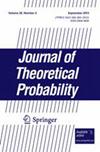Positive Reinforced Generalized Time-Dependent Pólya Urns via Stochastic Approximation
IF 0.6
4区 数学
Q3 STATISTICS & PROBABILITY
引用次数: 0
Abstract
Consider a generalized time-dependent Pólya urn process defined as follows. Let \(d\in \mathbb {N}\) be the number of urns/colors. At each time n, we distribute \(\sigma _n\) balls randomly to the d urns, proportionally to f, where f is a valid reinforcement function. We consider a general class of positive reinforcement functions \(\mathcal {R}\) assuming some monotonicity and growth condition. The class \(\mathcal {R}\) includes convex functions and the classical case \(f(x)=x^{\alpha }\), \(\alpha >1\). The novelty of the paper lies in extending stochastic approximation techniques to the d-dimensional case and proving that eventually the process will fixate at some random urn and the other urns will not receive any balls anymore.
通过随机逼近实现正向强化的广义时变波利亚乌恩
考虑一个广义的随时间变化的波利亚瓮过程,其定义如下。让 \(d\in \mathbb {N}\) 是瓮/颜色的数量。在每个时间 n,我们将 \(\sigma _n\) 个球按 f 的比例随机分配到 d 个瓮中,其中 f 是一个有效的强化函数。我们考虑了正强化函数的一般类别(假设有一些单调性和增长条件)。该类函数包括凸函数和经典的 \(f(x)=x^{\alpha }\), \(\alpha >1\).本文的新颖之处在于将随机逼近技术扩展到了 d 维情况,并证明了最终过程将固定在某个随机瓮上,而其他瓮将不再接收任何球。
本文章由计算机程序翻译,如有差异,请以英文原文为准。
求助全文
约1分钟内获得全文
求助全文
来源期刊

Journal of Theoretical Probability
数学-统计学与概率论
CiteScore
1.50
自引率
12.50%
发文量
65
审稿时长
6-12 weeks
期刊介绍:
Journal of Theoretical Probability publishes high-quality, original papers in all areas of probability theory, including probability on semigroups, groups, vector spaces, other abstract structures, and random matrices. This multidisciplinary quarterly provides mathematicians and researchers in physics, engineering, statistics, financial mathematics, and computer science with a peer-reviewed forum for the exchange of vital ideas in the field of theoretical probability.
 求助内容:
求助内容: 应助结果提醒方式:
应助结果提醒方式:


